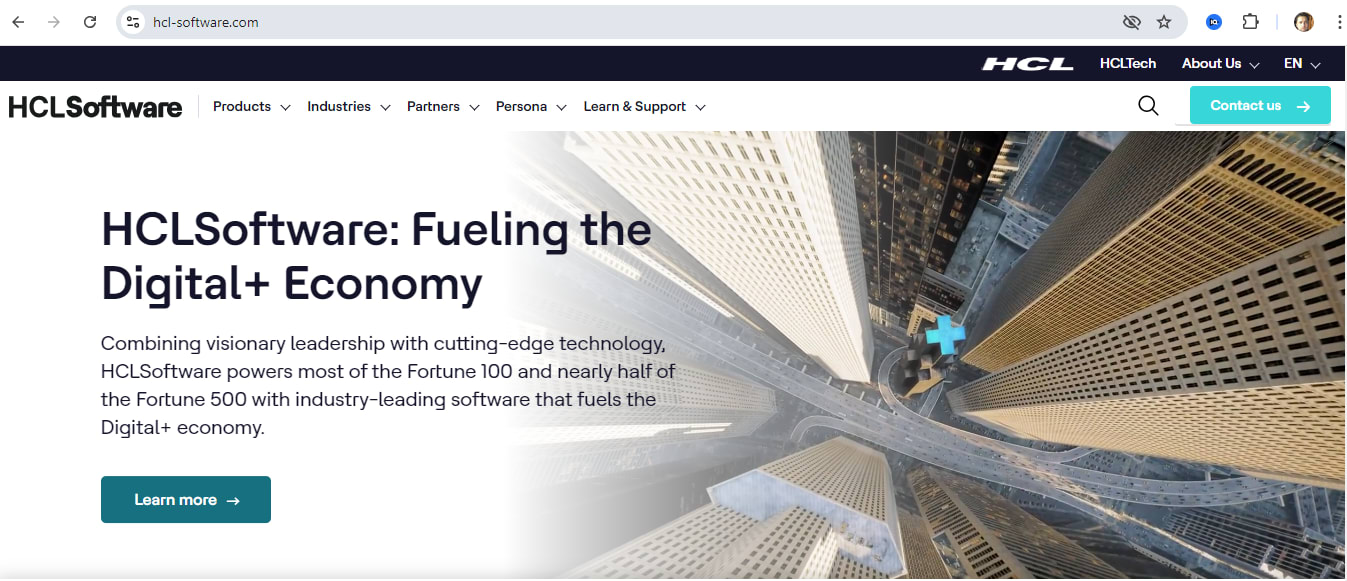HCL Software
Client Overview: HCLSoftware is a division of HCL Technologies, providing a wide range of software solutions for digital transformation across various industries. Their portfolio includes DevOps, security, automation, AI, and data analytics products designed for enterprise clients. As a part of the IT sector, competition is fierce, and ranking for relevant keywords is crucial to driving qualified leads and traffic.
Challenges:
Highly Competitive Industry: The enterprise software market is extremely saturated, with industry giants like IBM, Microsoft, and Oracle dominating search engine results pages (SERPs). Competing for keywords around DevOps, automation, AI, and data security requires a focused SEO strategy to stand out in a crowded field.
Complex Product Offerings: HCLSoftware offers a variety of enterprise-level solutions, each targeting different verticals and industries. This complexity made it difficult to create unified SEO messaging while still addressing the specific needs of each segment.
Low Organic Visibility: Before implementing an SEO strategy, many of HCLSoftware’s key products were not ranking well in organic search for important, high-intent keywords. This resulted in a heavy reliance on paid traffic.
Global Reach with Regional Nuances: HCLSoftware operates globally, and SEO efforts needed to account for international variations in search behavior, language, and search engine preferences (Google, Baidu, etc.).
Technical SEO Issues: The website had some technical issues that were hampering its visibility, such as slow page load times, mobile usability issues, and unclear site architecture.
SEO Strategy: How We Achieved Rankings
1. Comprehensive Keyword Research and Segmentation
Initial Audit: We conducted a detailed SEO audit to understand HCLSoftware’s existing rankings and keyword opportunities. We identified key search terms across multiple product lines and industries, with a focus on high-intent keywords (e.g., "DevOps tools for enterprises," "AI-powered automation software," "enterprise security solutions").
Competitor Benchmarking: We analyzed competitors dominating the SERPs for overlapping keywords, focusing on identifying keyword gaps and opportunities. This included looking at both direct competitors like IBM and indirect ones in niche markets.
Keyword Segmentation: After the research phase, we divided keywords into segments such as brand awareness, product-specific, and informational queries. Each segment had different strategies to address both top-of-the-funnel (TOFU) and bottom-of-the-funnel (BOFU) audiences.
2. On-Page Optimization and Content Strategy
Content Revamp: We updated existing product pages to align with target keywords, ensuring they answered searcher intent with in-depth product features, benefits, and use cases. We also optimized meta titles, descriptions, and headers for primary and secondary keywords.
Blog and Thought Leadership: A content marketing strategy was developed to build topical authority. We created high-quality blogs, white papers, and case studies around enterprise-level software challenges like “How AI is Transforming DevOps” or “Automation Tools for Large-Scale Enterprises.” This content not only boosted keyword rankings but also earned backlinks from authoritative sources.
Optimized for User Experience: We ensured the pages were optimized for fast load speeds, mobile responsiveness, and clear navigation. A positive user experience not only helps with rankings but also improves conversion rates.
3. Technical SEO Improvements
Site Speed Optimization: We tackled slow page load times by optimizing images, minifying JavaScript, and enabling browser caching. This led to faster website performance, particularly important for mobile users.
Mobile-Friendly Redesign: The website was restructured with a mobile-first approach. This included improving font sizes, adjusting CTAs for touch interactions, and ensuring all content rendered properly across devices.
Schema Markup: We implemented structured data to help search engines understand the context of the content better, such as software product details, reviews, and frequently asked questions.
Canonical URLs: Given the size of the site, we optimized the use of canonical URLs to avoid issues with duplicate content and ensure Google indexed the correct pages.
4. Link Building and Outreach
Backlink Strategy: We launched a targeted backlink campaign to improve domain authority, focusing on acquiring links from high-authority websites in the tech and enterprise software space. Guest posts, partnerships with tech blogs, and case studies published on industry sites all contributed to strong backlink growth.
Brand Mentions: We used tools to track unlinked brand mentions and worked with the content team to reach out to relevant websites for backlinks. This helped HCLSoftware gain visibility across various media outlets and tech forums.
5. International SEO Approach
Localized SEO: Since HCLSoftware serves clients across multiple countries, we implemented country-specific SEO strategies. This involved localizing content, creating subdomains for key regions (e.g., “hclsoftware.com/de” for Germany), and ensuring that hreflang tags were correctly applied.
Regional Keyword Research: We conducted keyword research for each region, focusing on local search behavior and language nuances. For example, targeting “enterprise software solutions” in English-speaking markets, while focusing on German equivalents for the DACH region.
Multilingual Content: Content was created in multiple languages to better engage international audiences and improve local rankings on search engines like Baidu and Yandex.
6. Performance Monitoring and Continuous Optimization
Monthly Reporting: We tracked key metrics like organic traffic, keyword rankings, and conversion rates on a monthly basis. Using tools like Google Search Console and SEMrush, we monitored performance across regions and product lines, making ongoing adjustments based on the data.
CRO (Conversion Rate Optimization): After driving more traffic to key landing pages, we focused on improving conversion rates through A/B testing of CTAs, form placements, and copy adjustments, ensuring HCLSoftware not only ranked well but also captured leads effectively.
Results Achieved
Increase in Organic Traffic: Within 6 months, HCLSoftware saw a 60% increase in organic traffic, with significant growth in both TOFU and BOFU content categories.
Improved Keyword Rankings: Multiple high-intent keywords such as “DevOps for enterprises” and “AI-powered automation tools” reached page one, with competitive product pages ranking in the top 5 for many core terms.
Global Reach Expansion: The localized SEO strategy led to a 40% increase in organic traffic from international regions, with notable improvements in non-English-speaking markets.
Enhanced User Experience: Site speed improvements, mobile optimization, and a better navigation experience contributed to a 15% reduction in bounce rate and a 20% increase in average session duration.
Domain Authority Growth: The targeted link-building strategy led to a 25% increase in the domain authority of hclsoftware.com, helping it compete more effectively with major industry players.
Conclusion:
Through a tailored, multi-faceted SEO approach, HCLSoftware was able to overcome industry competition, optimize its complex product offerings, and significantly improve its organic presence on a global scale. By aligning technical SEO, on-page content optimization, and strategic link building, HCLSoftware achieved sustainable growth in organic search, driving both traffic and conversions.
01 Nov 2023







